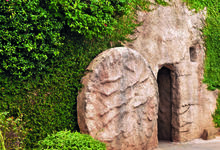Easter: What we see and understand is—by far not—all there is!
“Easter? That means no school!” says little Laura. Mind you, she also knows that Easter is more than a holiday, but also a high feast of the church. It is the day when Jesus Christ resurrected from the dead.

Children understand this better than adults. Faith feels right at home in places that rational thought can no longer access. And a human being has no choice but to exercise faith when it comes to the matter of the resurrection. Is there any proof of it? Sure there is—even though all of this is very difficult to comprehend and even though none of us were there. “The resurrection of Jesus Christ is not wishful thinking on the part of His followers who sought to make future generations believe in a miracle. Nor is it an expression of mythological thinking. The resurrection of Christ is historical reality. It actually took place.” This is what the New Apostolic Catechism says in section 3.4.11. Other churches say the very same thing. And yet, for centuries, there have been controversial disputes and debates over this miraculous event.
I have never seen anyone who has ever resurrected!
But several contemporaries of Jesus certainly did! They saw Him, their Lord and Master. Mary Magdalene, Mary the mother of James, the disciples of Emmaus, Peter, John, and even Paul—all of these individuals came into contact with the risen Son of God. One of His disciples, namely Thomas, was even told to put his hands into the Lord’s wounds in order to be able to “grasp” what had happened. On one occasion He was seen by more than 500 people at once.
But how can that be? A man who resurrects from the dead?
Jesus was not only a Man of flesh and blood. He is also the Son of God. True Man and true God. Human beings must summon up faith if they desire to believe in the mystery of the resurrection. Christians are familiar with this: that which we see and understand is not all there is—by far not! Faith gives us the strength to look behind the curtain.
Why is belief in the resurrection so important?
Because this is the prime foundation, the primal experience of faith. Without the resurrection, our faith would be empty. Pointless, as Apostle Paul states. The empty grave is the starting point for the whole Christian faith! Resurrection is a miracle of God—transcendent, supersensory, and incomprehensible. It is the central event of salvation. To believe in the historical Jesus Christ without going on to embrace this central position of the resurrection would be unchristian. Any theology that acknowledges the historical Jesus but rules out the resurrection falls short of the mark.
Concerning this, our Catechism goes on to say: “Profession of Jesus as the Christ and belief in His resurrection are of fundamental importance for the deliverance of mankind. This belief in the resurrection of Christ, the ‘firstfruits of those who have fallen asleep’ constitutes the foundation for the resurrection of the dead in Christ and the transformation of the living at His return” (Catechism 3.4.11.1).
But now Christ is risen!
Apostle Paul, who only saw the Risen One much later than all the others, states: “Now if Christ is preached that He has been raised from the dead, how do some among you say that there is no resurrection of the dead? But if there is no resurrection of the dead, then Christ is not risen. And if Christ is not risen, then our preaching is empty and your faith is also empty. Yes, and we are found false witnesses of God, because we have testified of God that He raised up Christ, whom He did not raise up—if in fact the dead do not rise. For if the dead do not rise, then Christ is not risen. And if Christ is not risen, your faith is futile; you are still in your sins! Then also those who have fallen asleep in Christ have perished. If in this life only we have hope in Christ, we are of all men the most pitiable. But now Christ is risen from the dead, and has become the firstfruits of those who have fallen asleep” (1 Corinthians 15: 12–20).
Photo: Choat








